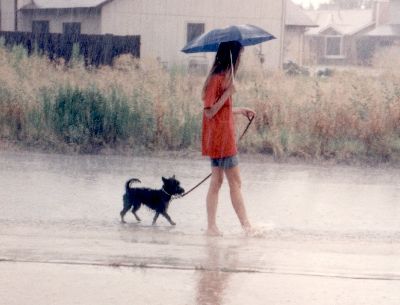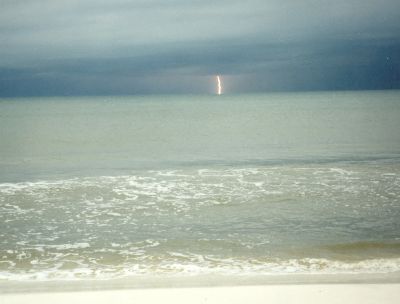
Valerie and Frisky playing in the rain,
Austin, Texas, October, 1990
When I was growing up in Illinois, rain occurred with regularity and in ample quantity. I never even thought about it very much, but just took it for granted. Our gardens produced abundant food and flowers every year, while the grass grew green and lush in summer. The winters brought plenty of snow, and the spring floods cleaned up all the creeks and rivers. Stream levels might fluctuate, but they never went dry.
 Valerie and Frisky playing in the rain, Austin, Texas, October, 1990 |
I've only lived and visited in a few places, but the patterns of precipitation have impressed me as contributing as much to the personality of an area as anything else. Total rainfall each year, as well as the regularity in which it is delivered, determines the vegetation and native fauna. But there is a more subtle influence on the landscape. The quick, sometimes violent rainstorms that characterize summer in the Colorado mountains might disrupt outdoor plans, but only for a moment, before the sun comes back out and the freshly watered earth glistens with a clean sparkle. The same summer storms that occur in Florida are so regular that people actually schedule garage sale hours to be "from 8 AM until rain." Even in the late summer, when temperatures can start to soar, those welcome afternoon rains always cool things down to tolerable. Early spring rains in Michigan seemed to last a long time, as if the clouds were just casually releasing their loads. We got so used to hiking and camping in the rain that I still reminisce about enjoyable camping experiences during cool, wet weather. Spring rains in Florida were similar, lasting all night while producing a comforting patter on our tent, or requiring umbrellas all day for hiking.
It is evident that rain can also be a terrible force, when it comes too quickly and in too great a quantity, producing flash floods and mudslides. However, the worst of these problems seem to occur where people have built impervious cover over crucial watersheds, cut down trees that would absorb the water, or decided to live in the floodplains of major rivers. The sleet, ice, and snow storms that invariably happen each winter are only irritating in the way they disrupt people's schedules and destroy their structures. Before cities, roads, utility lines, and houses, there was probably no more damage to the landscape than broken branches and felled trees.
 Approaching storm in the Gulf of Mexico, St. Joseph's Pennisula, Florida |
Rain teaches us patience, as it is in no hurry. It forces us to be adaptable, as it keeps its own schedule, over which we have no control. Rain even makes us learn to anticipate the unexpected, as it might occur at any time and in any amount. The worst case of hypothermia I ever suffered was on a long beach hike in Florida during May one year, when an unexpected storm moved in and drenched us for hours. We had been prepared to ward off the sun, but not thought to bring ponchos or raincoats. Rain also rewards us with exciting storms, moody London fogs, and dazzling rainbows.
It could be my zodiac sign being Pisces, or the amount of time I have spent enjoying canoeing, kayaking and swimming, but I adore wet weather. Yes, I've been miserable when it is nearly freezing and continues to rain on our campsite in Colorado, or when my glasses are coated with tiny droplets during a long walk, but these experiences don't seem to diminish the pleasure I experience when the earth is saturated and moist. I've also enjoyed walking through refreshing summer thunderstorms and silent, enveloping midnight snowstorms. Returning to a warm, dry house takes on new meaning when one is cold and wet. A day full of sunshine is only truly magnificent when it occurs in contrast to days of life-giving rain, overcast and gloomy, but the basis for our fertile planet.